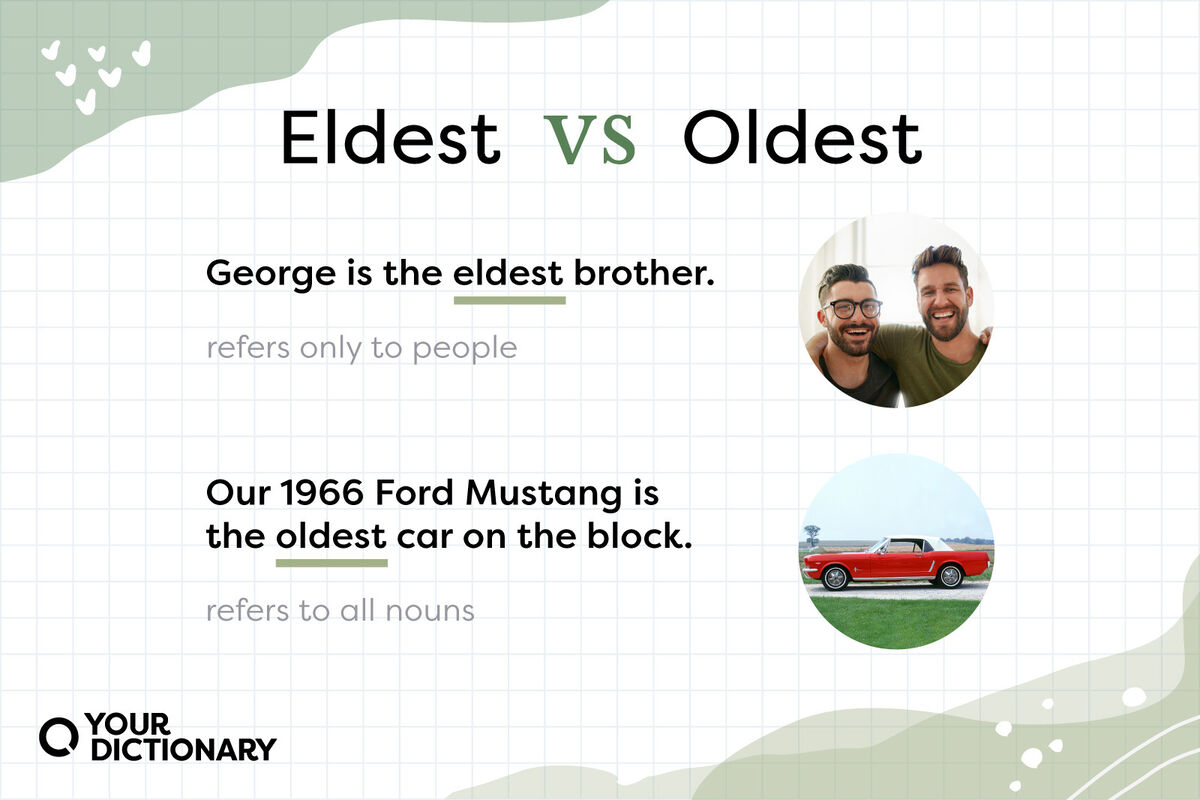
If you are the firstborn in your family, you can refer to yourself as either the eldest or the oldest. But that's not the case with every noun! Determine when you should use eldest vs. oldest in a sentence and how their grammatical functions can be quite different.
Is It Eldest Child or Oldest Child?
The superlative adjectives eldest and oldest can both refer to a person with the most advanced age. But in every other situation, these words aren't interchangeable.
- eldest - refers only to people (usually related)
- oldest - refers to any noun
If a family has three daughters, you can refer to the firstborn as the eldest or as the oldest. But if you're talking about other nouns, such as houses in a neighborhood, the first one that was built is the oldest house.
Use Eldest for People
The word eldest describes the firstborn member of a family group, typically in a set of siblings. It can also refer to the oldest person in an extended family. When you're using eldest, you're describing family relationships.
Eldest as an Adjective
Eldest most often appears as a descriptive adjective before the noun (such as "eldest son") but can also function alone when describing a child. For example:
- George is the eldest brother.
- My great-grandmother Margaret is the eldest member of our family.
- Laura is my eldest daughter.
- Traditionally, the eldest son takes control of his father's estate.
- Where does your eldest child go to school?
If these sentences feel a little old-fashioned to you, you're probably used to using oldest instead of eldest. While oldest would be grammatically correct, eldest is a more accurate word to use when describing family relationships.
Eldest as a Noun
Like most superlatives, eldest can function as a noun when the meaning is easily understood. Because eldest refers to family relationships, it's not difficult to discern its meanings as a noun. For example:
- Sharon's eldest works in a coffee shop.
- When was your eldest born?
- I'm the eldest of six children.
- Who's the eldest in the family?
- Mark's eldest is on the phone.
You can tell that eldest refers to "eldest child" in these sentences. This usage is especially common when a possessive determiner comes before eldest in a sentence (my eldest, your eldest, and so on).
Use Oldest for Anything
Oldest refers to the senior age of any noun, not just people. It's more popular than eldest and feels more familiar to most modern writers. For example:
- The oldest tree in North America is a California pine tree.
- Mr. Yang is the oldest painter in my art class.
- Our 1966 Ford Mustang is the oldest car on the block.
- The Bible is one of the oldest texts still in circulation.
- Lily is the oldest first grader in the class.
In these cases, oldest refers to age. It compares nouns that are more advanced in years with nouns that aren't.
Eldest Doesn't Always Mean Oldest
The eldest person in the room isn't necessarily the oldest. Because the meaning of eldest is "most senior," it can refer to the most experienced person in a group, regardless of age. For example:
- 30-year-old Kelly has ten years of teaching experience.
- 50-year-old Nancy has five years of teaching experience.
- Kelly is the eldest teacher, and Nancy is the oldest teacher.
What About Elder and Older?
Another difference between eldest and oldest is in their comparative adjective forms, elder and older. Both elder and older refer to the person in a group of two or more with the highest age. For example:
- The elder brother took over the family business.
- My older daughter cooks the best glazed ham.
However, only elder can function as a noun that describes a senior citizen. For example:
- Our culture values the traditions of our elders.
- You should always respect your elders.
In addition, only elder can add an -ly to become an adjective that means "an older person." For example:
- The clinic provides affordable medical treatment for elderly people.
- I stood up to give an elderly woman my seat on the bus.
When you take the words down to their most basic forms, you'll find that only one works as an adjective. Old is a common adjective, while eld is an archaic noun not commonly used in modern English.
Keep Your Adjectives Straight
Superlative adjectives such as eldest and oldest are an important addition to a well-rounded vocabulary. But understanding their differences can be trickier than it looks! Learn all about commonly misunderstood adjectives with a guide to historic vs. historical.